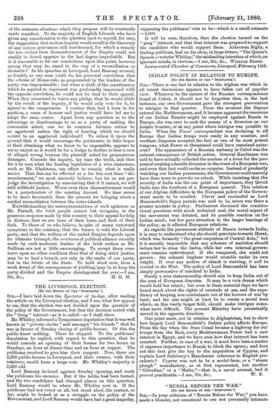THE LI V ERPOOL ELECTION.
(TO THE EDITOR OF THE " SPECTATOR:1 have laid down the Spectator of to-day, after reading the article on the Liverpool election, and I see, what few appear to see, that the election was not decided upon the question of the policy of the Government, but that the decision rested with the " Grog " interest—as it is called—as I shall show.
Mr. Whitley informed a Temperance deputation that it was well known in "private circles "and amongst "his friends" that he was in favour of Sunday closing of public-houses. Of this the public knew nothing. There he stopped. To the publicans' deputation he replied, with regard to this question, that be would concede an opening of their houses for two hours on Sundays, an hour at dinner-time and an hour at supper. The publicans resolved to give him their support. Now, there are 2,200 public-houses in Liverpool, and their owners, with their retainers, would form a large vote. Mr. Whitley's majority is 2,200 odd.
Lord Ramsay declared against Sunday opening, and made the publicans his enemies. But if the tables had been turned, and the two candidates had changed places on this question, Lord Ramsay would be where Mr. Whitley now is. If the publicans had not voted at all, but stood aloof, the contest, so far, might be looked at as a struggle on the policy of the Government, and Lord Ramsay would have had a good majority, supposing the publicans' vote to be—which is a small estimate- -3,000.
It will be seen, therefore, that the election turned on the- " grog " interest, and that that interest was prepared to support the candidate who would support them. Alderman Rigby, a. leading publican, had on his shop, in large letters," The Queen's Speech,—vote for Whitley," the misleading intention of which, on, ignorant minds, is obvious.—I am, Sir, &c., WILLIala BLOOD.
Incorporated Chamber of Commerce, Liverpool, February 1404.


































 Previous page
Previous page